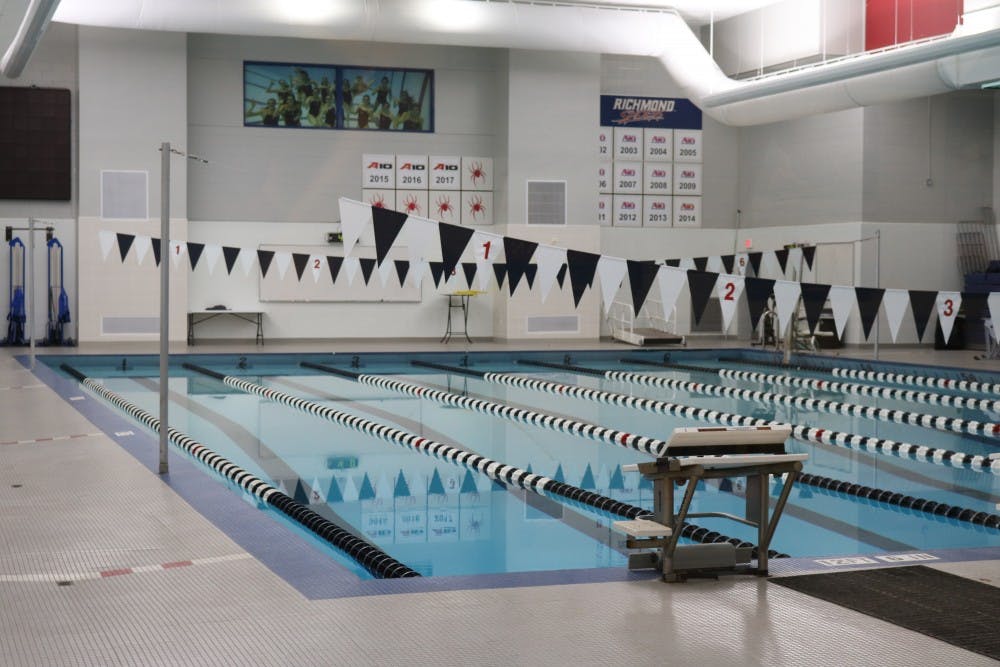Although some college coaches dream of bigger and better facilities, head women's swimming and diving coach Matt Barany believes the secret to success at the University of Richmond is simply a better balance between strain and recovery.
Athletic facility improvements have been taking place across UR's campus recently, including resurfacing of the track and the turf football field, new lacrosse offices and a field house for the field hockey team.
However, as construction on the new Well-Being and Queally Athletics Center is underway, Barany said it is unlikely that any talks of a new swimming pool will be heard anytime soon.
Instead, the coach -- who has won 11 Atlantic-10 conference championships in his 14 years at UR -- chooses to focus on alternative ways to improve his team's performance outside of the water.
About three years ago Barany started experimenting with the WHOOP, a health-tracking bracelet technology, helping him to better understand student-athlete strain and recovery. UR swimmers and divers can choose to wear the device 24/7, tracking their sleep cycles, resting heart rate and heart-rate variability.
A good night’s sleep consists of three to five cycles between non-REM and REM sleep, Barany said. The bracelet also tracks the number of disturbances in the night, which is used to calculate a percentage of efficient sleep.
Barany's data, based on these biometric readings, suggested that the most stressful times in the fall semester for his student-athletes are during Family Weekend and the week of midterm exams.
These findings reveal some question as to whether UR should put the same amount of focus on mental health awareness and de-stressing during midterm exams as it does during the week of final exams, Barany said.
Barany stressed the need for everyone, not just his student-athletes, to get a better night’s sleep.
“We’re learning the negative effects of sleep deprivation are significant," he said. "The days of wearing the 'limited sleep badge of honor' are over.”
Barany said it would be beneficial to consider sleep education as a way for students to cope with stress and anxiety. Barany introduced Headspace, a meditation app, to UR’s Department of Athletics as a resource to help student-athletes reduce stress, remain focused and improve sleep quality.
Dedicated meditation, journaling and positive visualization can create a good night’s sleep for everyone, not just Barany's athletes. Alcohol, caffeine and cellphones are the greatest threat, he said.
Enjoy what you're reading?
Signup for our newsletter
Last season, Barany’s student-athletes recorded an average sleep period of six hours and 57 minutes.
"This year, we are hoping to increase sleep duration and improve sleep regularity," Barany said. "You cannot perform at a max level with less than seven hours of sleep, and it also poses health concerns."
The swimming and diving team often has early-morning practices with another practice held in the evening. Double practices further stress the importance of sleep for energy purposes, Barany said.
“At the end of the day, improved sleep habits might help us swim faster, but we know it helps the body rejuvenate, fight off sickness and improve brain function, creativity and memory,” he said.
Although WHOOP provides a unique opportunity to track UR swimmers’ sleep health, it has caused more stress than insight for sophomore Kristine Mihm.
“I think the WHOOP is a great device that allows athletes to understand how they can maximize their recovery," Mihm said. "But for me personally, I began to develop sleep anxiety and let the recovery score dictate how I was feeling for the day.”
Senior Hannah Gouger has committed to using the WHOOP 24/7. Gouger is one of the most successful swimming and diving student-athletes in program history, having accrued first-place accolades at the A-10 championships, qualified for the NCAA tournament and made the cut for the 2020 Summer Olympic Trials this past season.
“You never realize how important sleep is to your physical and mental health until you’re not getting enough of it," Gouger said. "The WHOOP is a great tool that allows us to learn things about our bodies and strive to be better in and out of the pool.”
Contact sports writer Grace Mittl at grace.mittl@richmond.edu.
Support independent student media
You can make a tax-deductible donation by clicking the button below, which takes you to our secure PayPal account. The page is set up to receive contributions in whatever amount you designate. We look forward to using the money we raise to further our mission of providing honest and accurate information to students, faculty, staff, alumni and others in the general public.
Donate Now



